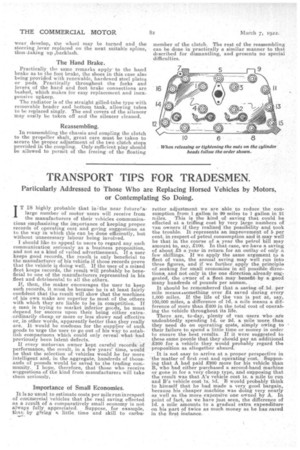TRANSPORT TIPS FOR TRADESMEN.
Page 22

If you've noticed an error in this article please click here to report it so we can fix it.
Particularly Addressed to Those Who are Replacing Horsed Vehicles by Motors, or Contemplating So Doing.
T IS highly probable that in;the near future7a. large number of motor users will receive from
• the manufacturers of their vehicles communications emphasizing the importance of keeping proper, records of operating cost and giving suggestions as to the way in which this can be done efficiently, but without unnecessary labour being involved. I should like to appeal to users to regard any such communication seriously as a business proposition, and not as a kind of veiled advertisement. If a user keeps good records the result is only beneficial to the manufacturer of his vehicle if those records prove that the vehicle is doing well. If the user of a mixed fleet keeps records, the result will probably be beneficial to one of the manufacturers represented in his fleet and detrimental to all the others.
If, then, the maker encourages the user to keep such records, it must be because he is at least fairly confident that the result will show that the machines of his own make are superior to most of the others with which they are liable to be in competition. If a man is trying to market inferior geods, he must depend for success upon their being either extraordinarily cheap or more or less showy and effective or, in other words, apparently better than they really are. It would be madness for the supplier of such goods to 'urge the user to go out of his way to establish comparisons which could only reveal what had previously been latent defects.
If every motorvan owner kept careful records of performance, the result, in a few years' time, would be that the selection of vehicles would be far more intelligent and, in the aggregate, hundreds of thousands of pounds would he saved to the trading community. I hope, therefore, that -those who receive suggestions of the kind from manufacturers will take them eeriously,
Importance of Small Economies.
It is so usual to estimate costs per mile run inrespect of commercial vehicles that the real saving effected as a result of a comparatively small economy is not always fully appreciated. Suppose, for example, that by &ins s little time and skill to carbu
retter adjustment we are able to reduce the consumption from 1 gallon in 20 miles to 1 gallon in 21 miles. This is the kind of saving that could be effected at a trifling cost by very large numbers of van owners if they realized the possibility and took the trouble. It represents an improvement of 5 per cent. in respect of petrol consumption and it may well be that in the course of a year the petrol bill may amount to say, 2100. In that case, we have a saving of about 25 a year in return for an outlay of only a few shillings. If we apply the same argument to a fleet of vans, the annual saving may well run into three figures, and if we further apply the principle of seeking for small -economies in all possible direction and not only in the one direction already suggested, the owner of a fleet may benefit by a good many hundreds of pounds per annum. .
It should be remembered that a saving of .1d. per mile means gsomethina. over 14 saved during every 1,000 miles. If the life of the van is put at, say, 100,000 miles, a difference of Id. a mile means a difference of more than 2400 in the total cost of operate ing the vehicle throughout its life. There are, to-day, plenty of van -users who are undoubtedly spending Id. or 2d. a mile more, than they need do on operating costs, simply owing to their failure to spend a little time or money in order to ensure the best results. If it were suggested to these same people that they should pay an additional 1200 for a vehicle they, would probably regard the proposition as altogether absurd.
It is not easy to arrive at a proper perspective in the matter of first cost and operating cost. Supposing that A had paid 2200 more for his vehicle than B, who had either purchased a second-hand machine or gone in for a very cheap type, and supposing that the result was that .A's vehicle cost Is. a mile to run and B's vehicle cost is. id. B would probably think to himself that he had made a very good bargain, because his cheaper machine was doing very nearly as well as the more expensive one owned by A. In point of fact, as we have just seen, the difference of Id. a mile amounts to a gradual extra expenditure on his part of twice as much money as he has saved in the first instance.






























